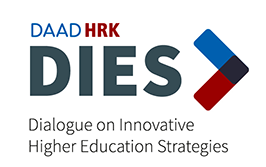News
The Didactic Concept
Implementation of the International Deans’ Course takes place in four stages covering a period of more than a year. The structure is based on the idea that the complex skills required in managing higher education institutions cannot be meaningfully discussed, imparted nor developed in just one session, which by design is limited to the absorbtion of information. Realizing fundamental, long-term change in this field is a process that takes time, requires joint reflection and needs to be broken down into phases capable of addressing case-specific problems and incorporating inputs, adapting strategies when necessary.
About 15 countries were identified to participate in the International Deans’ Course. Instead of accepting only one or two participants from each country, it was decided to divide the program into two alternating rounds: In its first year, the course would host participants from Africa, and the next year would feature participants from Asia. While the exchange of experiences between Africa and Asia would have yielded its own benefits, sharing among African participants and among Asian participants respectively was felt to be more constructive because it allows the exchange of experiences and best practices among more similar universities, countries and tertiary education systems.
The IDC was designed in such a way that each participant identifies a specific project he or she would work on in the months after the first training. It was reasoned that this would provide an opportunity to think about the applicability of methods and tools learned in their own academic environment. These "Personal Action Plans" will be explained in greater detail below.
Step 1: Workshops in Osnabrueck and Berlin
The first stage of the course aims to introduce important new concepts in higher education management. Participants are sensitized to new ideas and issues, contemporary forces of change and potentially relevant solutions already tested in Germany, in other European countries and around the world. At the end of this first stage in Germany, participants are requested to identify an issue that they will work on for the following months in the framework of a “personal action plan” (PAP). In the identification of this project, participants are applying newly required ideas and skills to their own individual working environments. This approach allows for a more active and relevant application of the ideas, concepts and theories introduced during the course and reduces the typical divergence of seminar content and professional reality. Progress on the personal action plans is shared regularly with other participants throughout the duration of the International Deans’ Course.
Step 2: Regional Workshops
The second stage entails a meeting of participants from the same country or region, joined by an expert from Germany, taking place a few months after the first stage in Germany. This meeting provides an opportunity to discuss progress on the participants' personal action plans and experiences of higher education management in general, utilizing the other expert participants in the DIES International Deans’ Course as resources. Participants have the chance to share milestones as well as roadblocks, allowing for joint reflection on forces hindering change and an opportunity to exchange views on potential alternatives. The meeting is characterized by intense discussion among participants, who, being drawn exclusively from the deans’ course, already know each other and have had the chance to develop mutual senses of trust and understanding. This creates a unique atmosphere, which is important for deliberation on comprehensive strategies of change and for getting to the heart of issues and matters. The regional meeting is a public forum where important issues in higher education are addressed. Topics selected for this open forum are quality management, change of governance and strategic management, among others.
Step 3: The Final Workshop
After an additional working period of approximately nine months, the third stage brings together all participants of the DIES International Deans’ Course to conclude with a final workshop. Successful personal action plans are utilized as casestudies, and remaining challenges are reassessed. Participants have a final opportunity to take advantage of expert resources in the field under the auspices of the International Deans' Course and to set up a professional network to last a career long. New input is provided, change processes are jointly reflected upon and lessons learned are discussed. This all contributes to the planning of future efforts.
Step 4: Follow up
There is an important follow-up to the DIES International Deans’ Course, the intraregional and inter-regional networking of participants. The DAAD specifically supports initiatives linking course participants to participants in other DAAD-activities related to higher education management and other relevant fields. And, many participants use their experiences and old or newly established contacts at German higher education institutions to identify joint projects, exchange information or to establish other forms of cooperation. The participants have access to various programs explicitly designed to place DAAD alumni in contact with each other and with other scholars in Germany.


